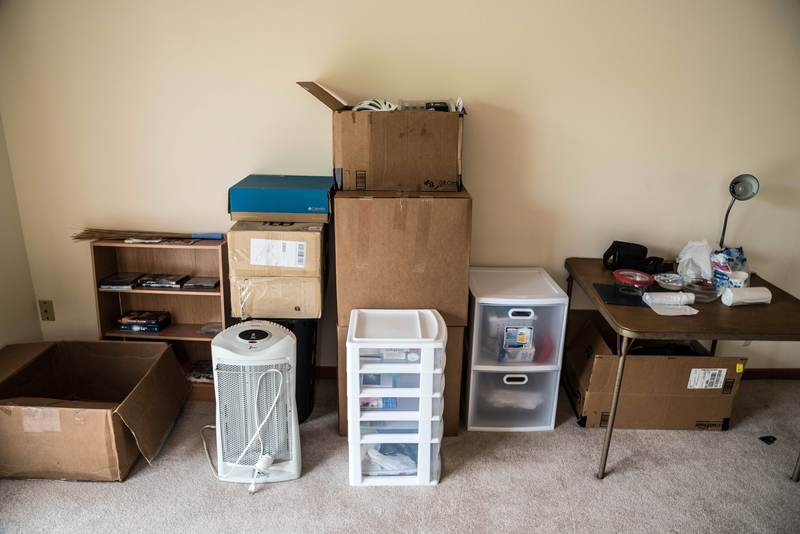Opinion | Let things go to let yourself grow
Photo Courtesy of GoodFreePhotos
Assorted moving boxes and containers filled with items rest in a room .
Apr 10, 2020
Having to move out two months early brought a whole new meaning to spring cleaning. As my freshman year on campus prematurely came to a close, what would have been weeks of gradual packing suddenly got compressed into a daylong endeavor.
While I sent garbage bags full of clothes home with friends in addition to my own duffel bag of clothes on the bus for spring break, I severely underestimated how much was still sitting in Room 407 of Allen Hall.
My dad, who knows I am a notorious overpacker, asked me what I still had at school a day before I moved out. I confidently told him there were just a few containers of living items and some other class-related belongings.
But when it got to actually putting everything in a cart and bringing it down Allen Hall’s prized possession that is the world’s slowest elevator, I realized just how much I had actually accumulated. And it was way too much for half a room of space.
The only pass I can give myself regarding the hoarding was my freshman status. I felt like whatever space I was occupying had to have everything I could possibly need and more. Plus, in moving to Champaign-Urbana, I wasn’t sure how accessible certain things would be between the Walgreens and the County Market we have on campus.
Get The Daily Illini in your inbox!
But moving out was definitely a wake-up call — and a good time for self-reflection. From this point forward, I am pledging to live more minimalistically. And I encourage everyone to do the same.
A Forbes article highlights the many benefits of minimalism, including having more room to focus on what is actually important and more flexibility for life changes. Whether that entails school suddenly closing because of a pandemic or simply a spontaneous move, owning less makes things much less complicated.
Everything I had accumulated in my room had also accumulated a lack of purpose. Even if a situation arose where I needed something I had stashed away, chances are I wouldn’t have known what to look for, simply because I forgot I had it.
Thus, there is so much more power in being practical. Owning fewer material items also means more room for making your space something that serves its purpose. Minimalism inherently helps to compartmentalize your life.
Over the last academic year, I have grown increasingly fond of the phrase “work while you work and play while you play.” This might just be something my parents tell me to ascertain I’m staying focused on the task at hand, but it has a twinge of truth to it.
I’ve always found it difficult to study in my room, because, to me, it’s the place where I rest. Minimalistic living allows for the creation of different environments within the space allotted to you. In order for cramped college living to feel bigger, the concept of “less is more” must be embraced.
Additionally, having less can also mean that you think less about material possessions. With a generational culture of online shopping when we’re bored in class or mindlessly making Pinterest boards of things we want, emphasis on materialism is a growing concern.
As young adults who will soon be living fully on our own, it’s especially important to get in the habit of separating “wants” from “needs” early on, so that when we have more money to budget toward spending, it is meaningfully spent.
When less money is spent on material items, it can go toward experiences that help you grow — vacations, gym memberships, class fees and more. Overall, there are countless benefits to minimalism for both the mind and the bank account.
As students, there’s a lot we are expected to master in the short time we’re here. In addition to academics and learning “how to adult,” add “the art of letting go” as a task to work on this spring cleaning season and reflect on how far this small change takes you.
Tara is a freshman in LAS.






